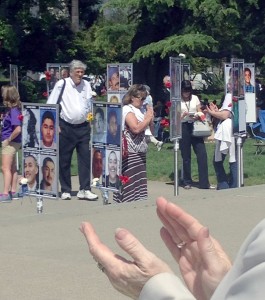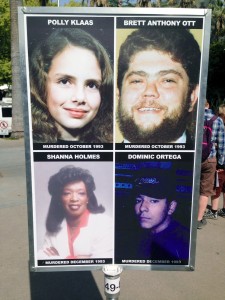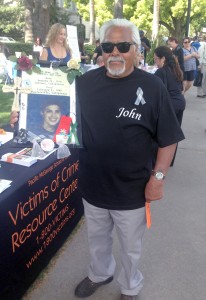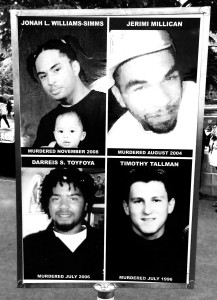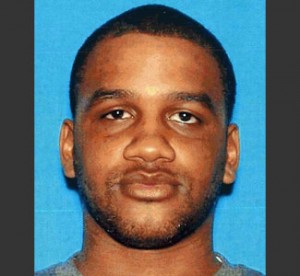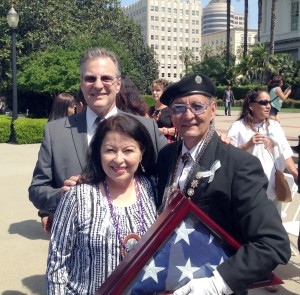 Today National Victim’s Rights Week was acknowledged on the West Steps of the State Capitol in Sacramento. Crime Victims United sponsored an event, so there were plenty of speeches and participating politicians included Governor Jerry Brown. However, it was the victims and murder victim family members who really stood out because each and every one interrupted their lives in order to take a stand for victim’s rights, acknowledge their lost loved ones, and lobby their legislators for effective public safety policy and legislation.
Today National Victim’s Rights Week was acknowledged on the West Steps of the State Capitol in Sacramento. Crime Victims United sponsored an event, so there were plenty of speeches and participating politicians included Governor Jerry Brown. However, it was the victims and murder victim family members who really stood out because each and every one interrupted their lives in order to take a stand for victim’s rights, acknowledge their lost loved ones, and lobby their legislators for effective public safety policy and legislation.
The importance of being personally involved in the political process cannot be overstated. I’ve been doing it since 1993, when my daughter was murdered by a violent offender with an extensive criminal history. In those days, there were very few legislative fall back positions for children who were being victimized. Call me a cynic, but I truly believe that was because kids don’t vote and politicians don’t have to look them in the eye. Therefore they didn’t have a real voice. 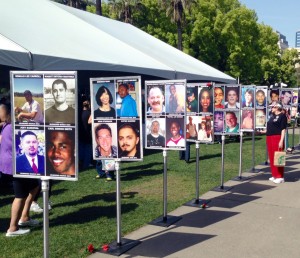 Things have changed enormously since then as the result of a series of tragic crimes and effective children’s advocates. We have Amber Alerts, Megan’s Law, law enforcement missing child protocols, and greater awareness and education surrounding child safety and child welfare issues.
Things have changed enormously since then as the result of a series of tragic crimes and effective children’s advocates. We have Amber Alerts, Megan’s Law, law enforcement missing child protocols, and greater awareness and education surrounding child safety and child welfare issues.
When I refer to being involved in the political process I’m not talking about the process as practiced in the houses of government that results in political perp walks on the 11:00 p.m. News. I don’t mean politicians like U.S. Congressman Mark Foley who left Washington D.C. in disgrace after he was found soliciting young boys serving as Congressional pages. I don’t mean pious hypocrites like Leland Yee, who I saw walking the halls of California’s Capitol on the day he got arrested, however I don’t think he’d been arrested yet because he wasn’t wearing handcuffs. I don’t mean corrupt politicians like state Senator’s Ronald Calderon and Roderick Wright who yesterday joined Yee in having their names and online archives disappear from the Senate website yesterday.
In 1995, I joined Fight Crime: Invest in Kids, a coalition of prosecutors, police chiefs and crime victims lobbying for prevention funding for at-risk children. In 1995 the federal government was funding quality pre-school and after school activities for 10,000 children, but today, in large part because of people like you and me who became personally involved in the political process that number has grown to 1,000,000.
I don’t mean the ideological political process that paralyzes legislative bodies throughout the United States. People have differences, but can usually find common ground on the issues that are important to us, particularly if those issues regard the well-being of our kids. However, ideological politics has paralyzed the legislative process so that nothing meaningful ever gets done.
Let me give you an example that perfectly illustrates how popular and common sense policy concepts that cannot get a vote in the legislature can become law when people become involved. In 2011 I spent a lot of time here at the Capitol with Chris Kelly, Suzanne DiNubile and others lobbying for legislation requiring registered sex offenders to include Internet identifiers like email address and social networking handles. We watched as two separate bills died in committee. In 2012 that concept became an integral component of Prop. 35. Under Daphne Phung’s vision and leadership Prop. 35 passed by the widest margin of any initiative in California history with more than 81% of the vote. 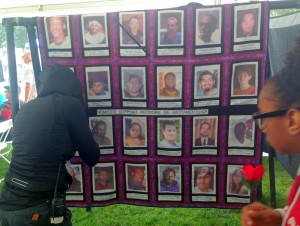 Today I went to the Capitol because National Victim’s Rights week is April 6-12. It represents an opportunity for people like me to remind our elected officials what’s really important. I’ve always felt that their primary duty is public safety, but the isolation and insulation of this building confuses them and sometimes they need to be reminded what is important and who they serve.
Today I went to the Capitol because National Victim’s Rights week is April 6-12. It represents an opportunity for people like me to remind our elected officials what’s really important. I’ve always felt that their primary duty is public safety, but the isolation and insulation of this building confuses them and sometimes they need to be reminded what is important and who they serve.
Right now there is a disturbing trend in the Capitol that is putting us all at risk. Many of the accomplishments that cut California’s crime rate in half 20-years ago is being undone by the legislators in this very building. Governor Brown’s realignment policy has dumped tens of thousands of violent criminals onto our streets. The repeal of 3-strikes will allow thousands of lifers to go free. Failure to enforce Jessica’s Law has allowed an untold number of registered sex offenders to abscond. A law written by Senator Lee will allow remorseless killers to be released back into society, and finally Governor Brown’s decision to parole more than twice as many lifers than his three predecessors combined. 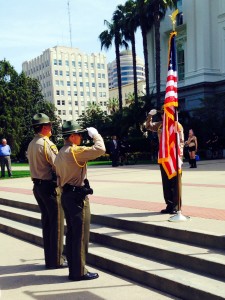 Without people like us making our views known to our elected officials we will find ourselves in dire straits. Because we live in dynamic communities that change and evolve and sometimes can be hazardous, while they live in marble lined halls where your hands don’t get dirty and your farts don’t smell. Sometimes they just need to be reminded that people matter, that showing the courage to do the right thing is more important than toeing the line for rigid ideology, or making decisions based on personal gain.
Without people like us making our views known to our elected officials we will find ourselves in dire straits. Because we live in dynamic communities that change and evolve and sometimes can be hazardous, while they live in marble lined halls where your hands don’t get dirty and your farts don’t smell. Sometimes they just need to be reminded that people matter, that showing the courage to do the right thing is more important than toeing the line for rigid ideology, or making decisions based on personal gain.





